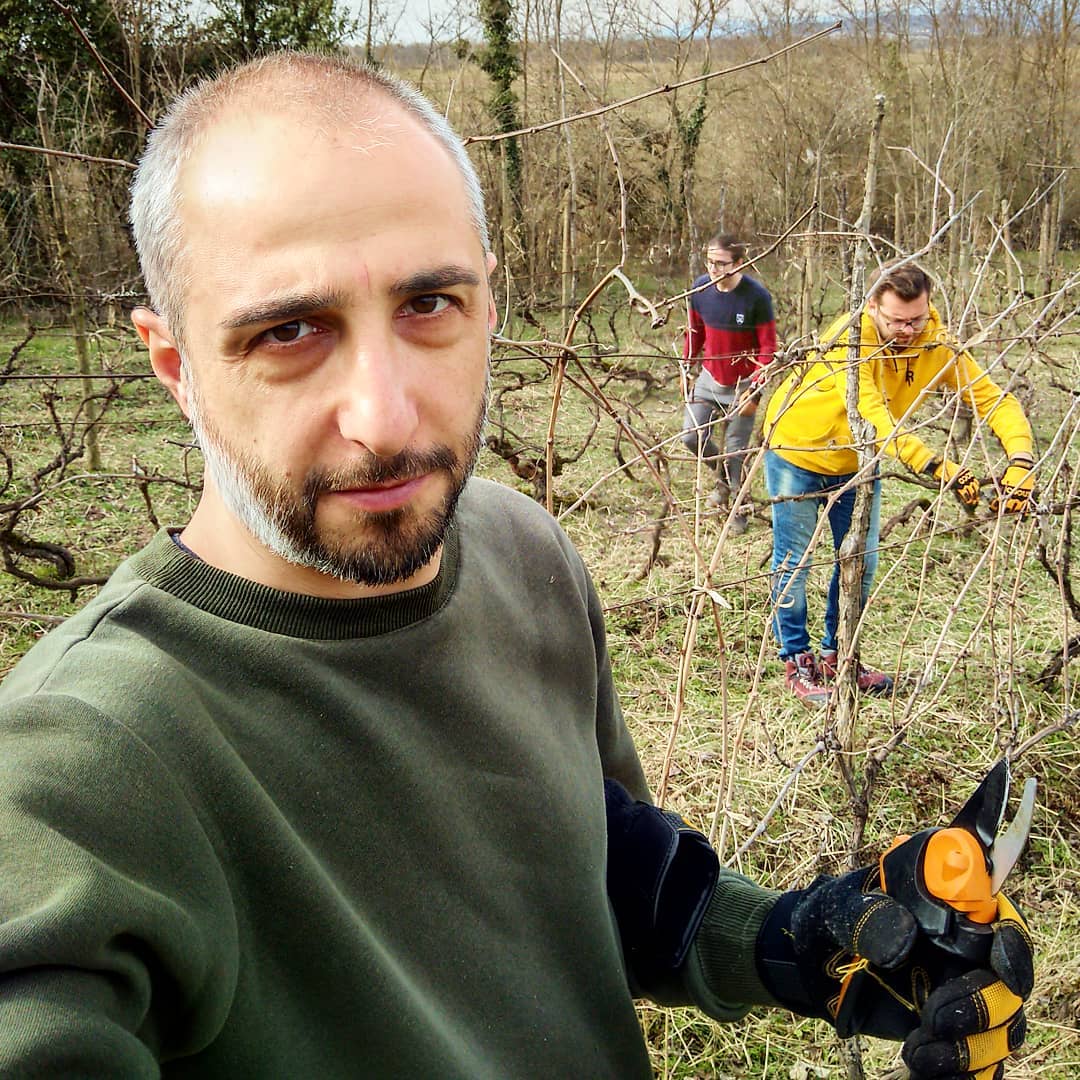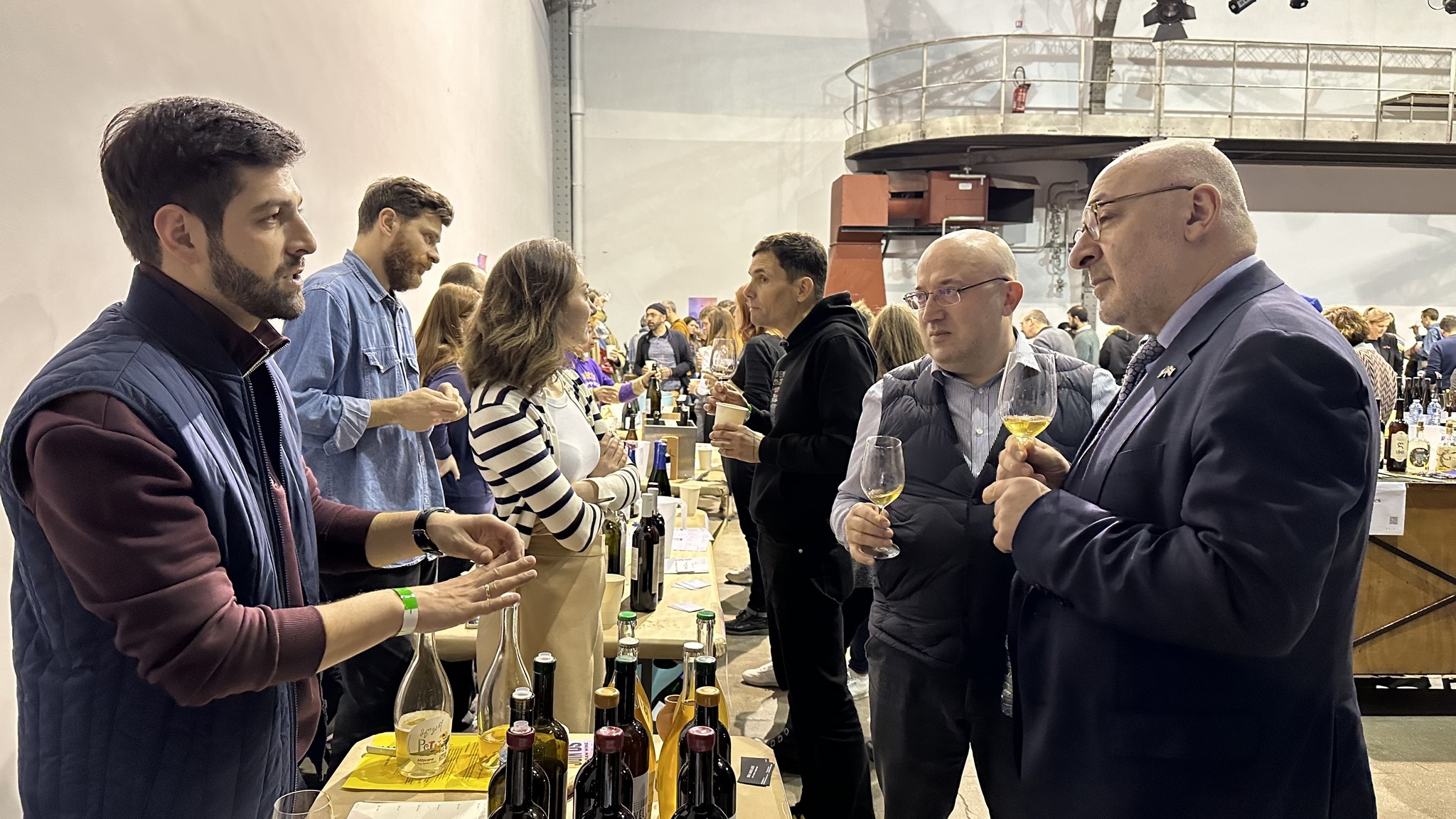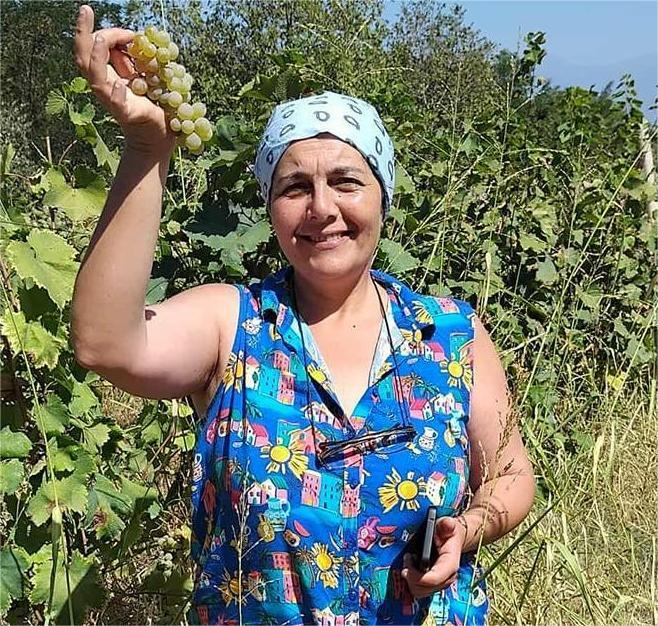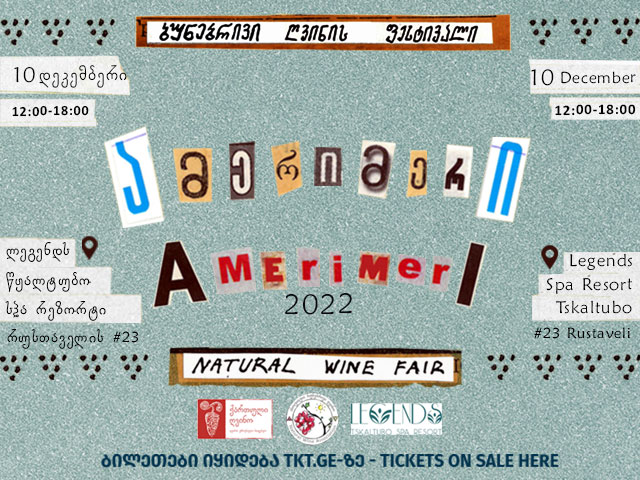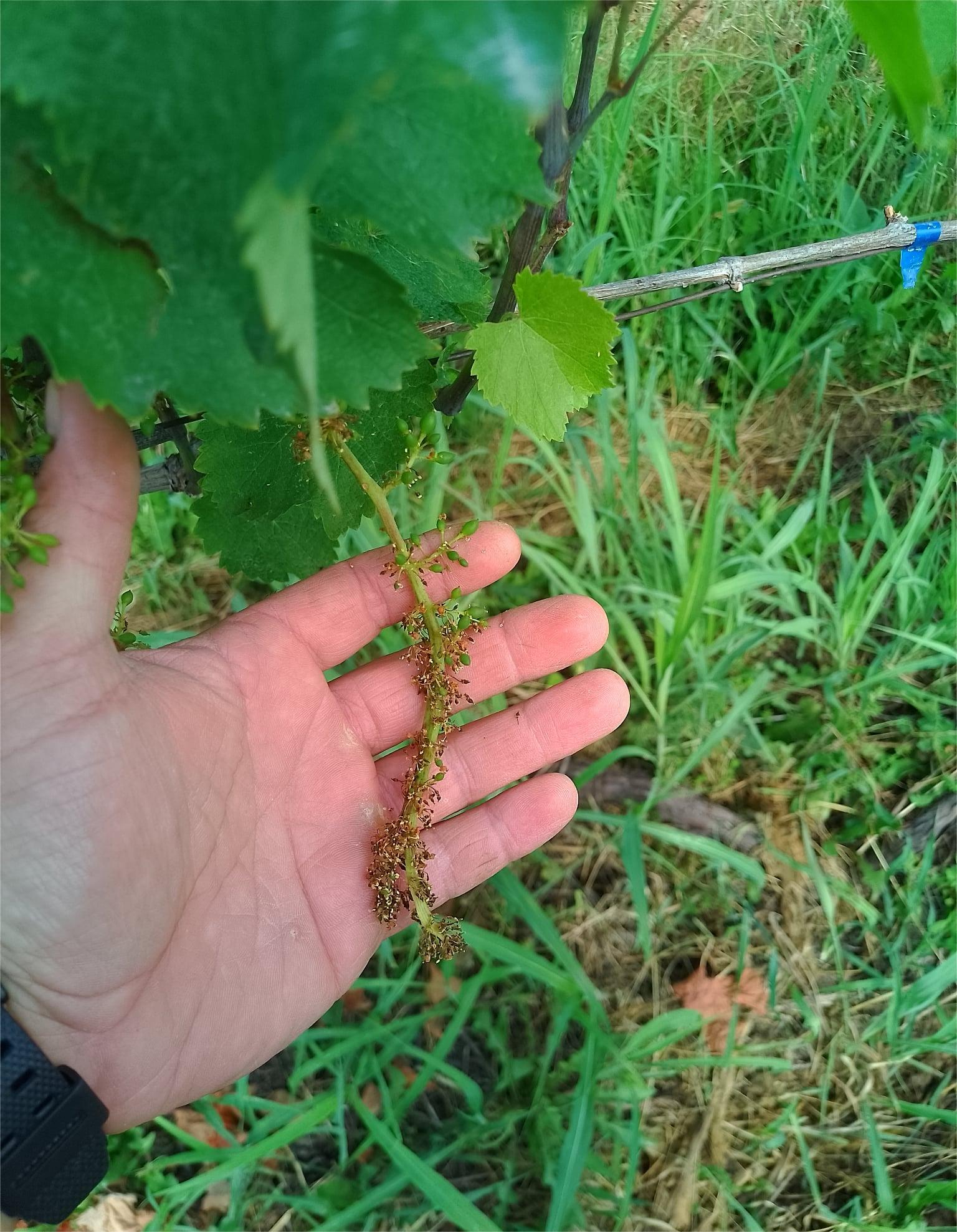News . 14-03-2022
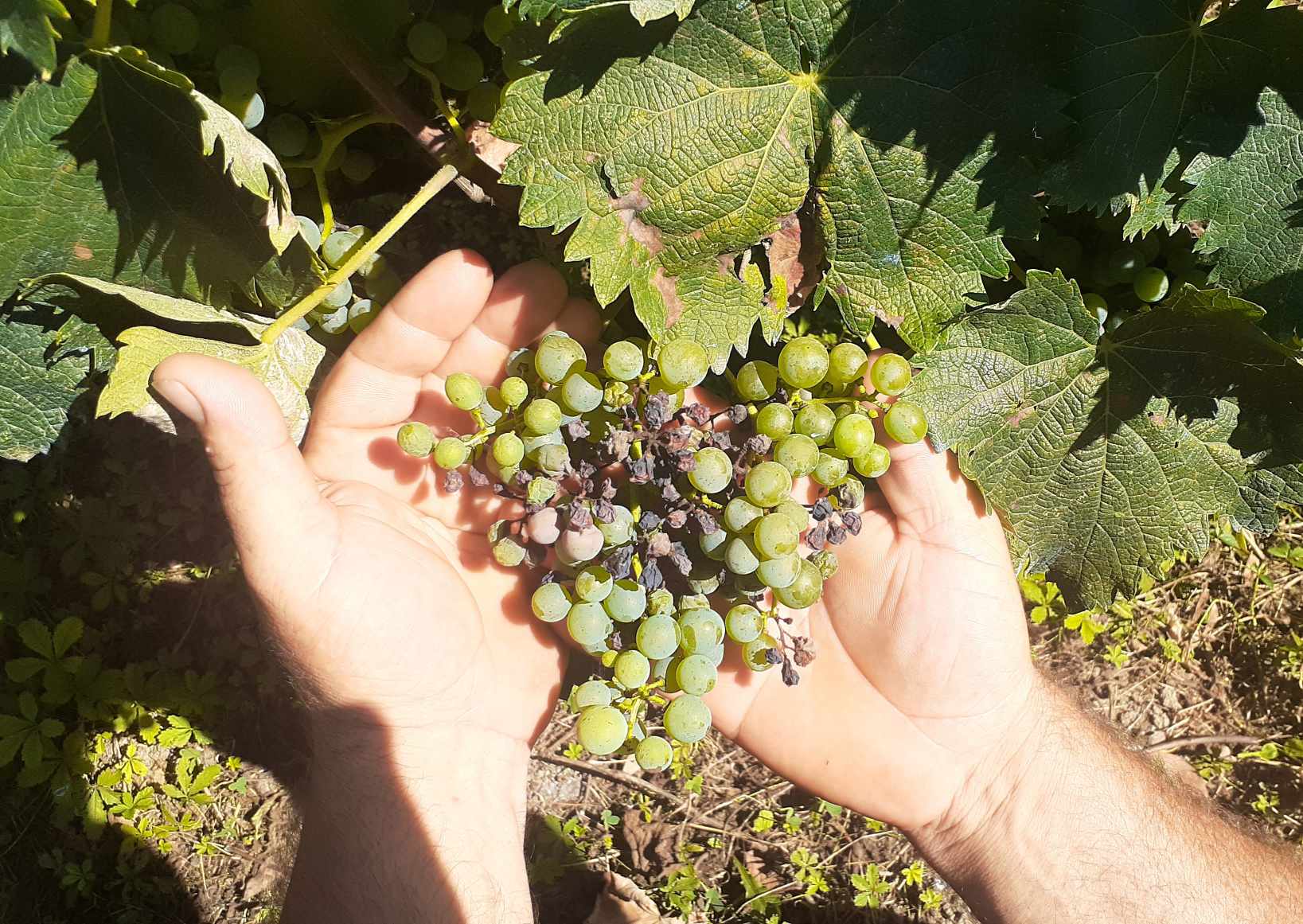
A difficult year
As the harvest season approaches, the growers are getting ready to collect their grapes. A difficult year - that’s how Georgian winemakers can briefly describe 2023 in terms of both the quality and the quantity of their crop. Powdery mildew, downy mildew, rot and other diseases reduced the grape yield by half or completely destroyed it. These diseases were mainly caused by frequent and intense rains that affected almost all of Georgia - except for a few exceptions. In addition to these diseases hailstorms and storms hit the vineyards several times in Kakheti.
While the harvest happens to be bad for Kakheti winegrowers in previous years, Kartli, Imereti or Guria fared better, in 2023 almost all wine-growing regions of the country are reporting a bad situation. Some areas are at risk of losing their entire crop this year.
The grape harvest is poor in the villages of Telavi municipality, which had a main problem with powdery mildew. The disease appeared repeatedly as a result of heavy rains and destroyed a significant part of the vineyards. The oddity of the year is that powdery mildew first affected Rkatsiteli, which is distinguished by its resistance to this fungal disease. Therefore, in Kakheti and Kartli, Rkatsiteli vineyards have been mainly cultivated since the Soviet period. Mtsvane Kakhuri, Kisi, Khikhvi, Saperavi and other varieties have relatively resisted the powdery mildew, but the harvest is also severely damaged in the vineyards of these grape varieties.
Giorgi Ghvardzelashvili, a member of the Association, vintner-winemaker from Kondoli says that he has suffered at least 40% of the harvest and the quality of the remaining grapes is very poor. “Almost all winegrowers nearby are disappointed. Fungal diseases spoiled white grapes in particular. We had a very bad year and I don’t remember a worse year”, says Giorgi Ghvardzelashvili.
The situation in Akhmeta is not good either. Powdery mildew persisted as the main problem in the villages of Akhmeta. Winegrower named Lekso Tsikhelishvili, who has vineyards around Akhmeta city, is distressed by the loss of his grapes due to fungal diseases: “This year, my vineyards completely destroyed Rkatsiteli harvest. Only some Mtsvane Kakhuri vineyards escaped the problem in Akhmeta. In Obolidziani, where my vineyard is, all of us who practice organic winemaking have no grapes left for wine making. So, I have nothing positive to say about this year. Let’s wait for autumn.”
Winegrowers from Kvareli did not have a good time either. Tamuna Bidzinashvili, a female wine grower, says that she lost 70% of her harvest in the vineyards located in the village of Gremi. The reason for this was the excessive rainfall and powdery mildew that occurred repeatedly.
This year, the storm caused problems for the people of Gurjaani as much as powdery mildew and downy mildew did. There are places in the villages of Gurjaani where they have given up on the harvest and resigned to their fate. Winemaker from Bakurtsikhe, Guja Goderdzishvili expresses well the difficulty of the 2023 harvest year shortly; “If we get 50% of the harvest, it will be good,” he told us.
Apart from powdery mildew, the storm was also a problem in Gurjaani. The villages of Garekakheti were affected by the well-known calamity - hail. As they say in Kakheti, hail knows how to repeat itself, and Garekakhels were also hit several times. Gogita Mchedlishvili, a vine grower and winemaker from Kakabeti, owner of “Iase’s Winery”, talks about the difficulties there: “All of my vineyards got hit by hail. Nothing was left in the vineyards down the road. The vineyards I had in the village were hit several times. First, they were hit in the bud and they produced a little fruit. Then the hail hit twice after flowering, and powdery mildew was added to that, which completely spoiled the harvest. I can only say bad things about this year.”
Father Gabriel (Khomasuridze), a winegrower from Kvemo Kartli, is a rare exception who talks about a normal year and gives us hope that we will still find winegrowers who miraculously survived powdery mildew. He has a small backyard vineyard and a cellar in the village of Gamarjveba, near Tbilisi.
Father Gabriel (Khomasuridze), wine cellar “Gabriel’s wine”: “This year is not much different from other past years. Accordingly, powdery mildew, downy mildew and other diseases did not particularly affect the vineyard. The biggest problem of this place is the long period of high heat and strong wind, which significantly damages both the new shoot and the adult vine. Last year I took the first harvest - 250 kg of Kartli’s Ghrubela. I expected much more this year. A strange thing happened. The vineyard looks good anyway, the horn growth is good, but the yield is low, and if anyone can help me figure out the reason, I would appreciate it. As for the assessment of the year, there were some uncertainties, but overall I am satisfied.”
The residents of Shida Kartli do not share the optimism of Father Gabriel from Kvemo Kartli. They suffered from vine diseases and early frost, which spoiled a large part of their harvest. Their situation was similar to that of Kakheti.
Ivane Stefanashvili, a winegrower from the village of Variani, Gori municipality: “Frost visited us again in the spring (the whites survived a little), and the problems of the vineyard started from there. Then, when these rains started, they didn’t stop. The powdery mildew put an end to everything. In the end, some “control shots” were “fired” by the hail and we lost a significant part of the harvest.”
It is assumed that this year the white grapes of Imereti will have an exorbitantly high price, and a kilogram will not cost less than 3 GEL. This is due to the supposed lack of harvest.
“I may still get 60% Dzelshavi of what I used to get in previous years. One vineyard of Tsitska was completely destroyed by powdery mildew and I stopped treatment in the middle stage. It didn’t make sense anymore; for me, the challenge is that I do not live near the vineyard, so I could not react instantly on the vineyard’s needs. But the promising thing is that the partner grower from whom I buy additional grapes was able to do this in his vineyard. Therefore, in total volume, I will probably make about 50% of the previous years’ amount of wine,” says Lasha Guruli, a winegrower and winemaker from the village of Akhalterjola.
The people of Lechkhumi, although not having a terrible year like Kakhelis, are still talking about a difficult year. They no longer await especially big harvest this year. “The vineyard suffered from powdery mildew in the cold, and in the end it will be less in quantity; however, better in quality if this situation remains before the start of the harvest,” says Zviad Asatiani, representative of “Asatiani Winery” located in the village of Tvishi.
As we have already said, in the opinion of Georgian winemakers, this year as a whole should be evaluated very poorly; however, there are some small and pleasant exceptions. The situation in the vineyards this year and the results of the problems will be best affected by the wines of the 2023 harvest.
Levan Sebiskveradze
